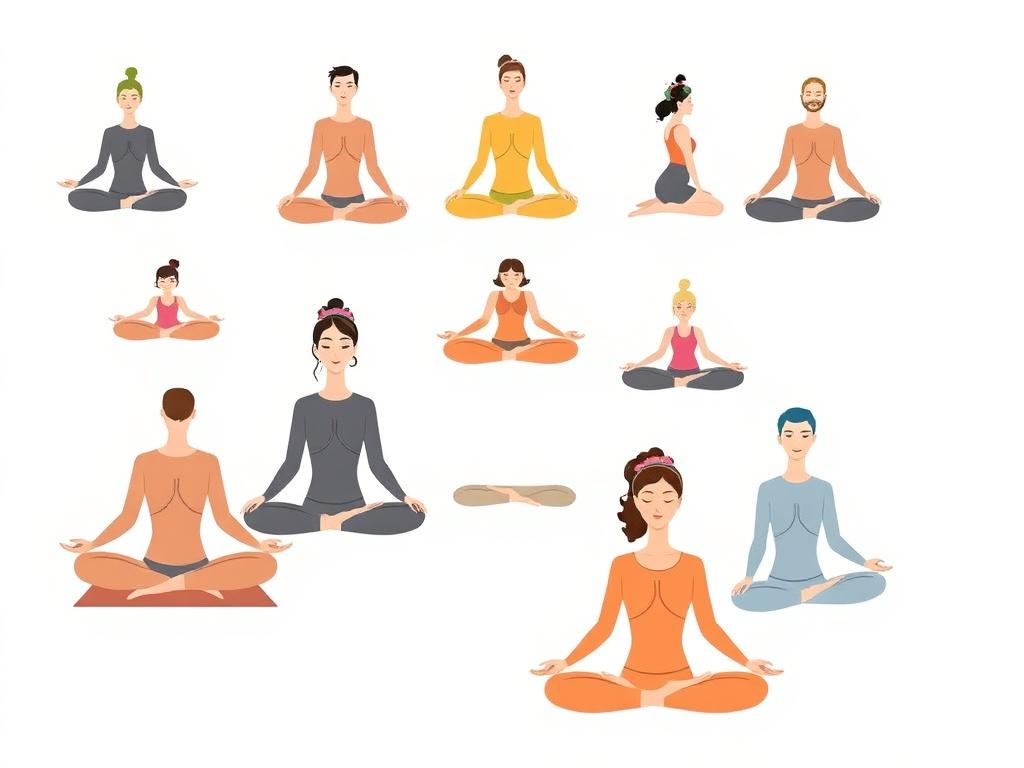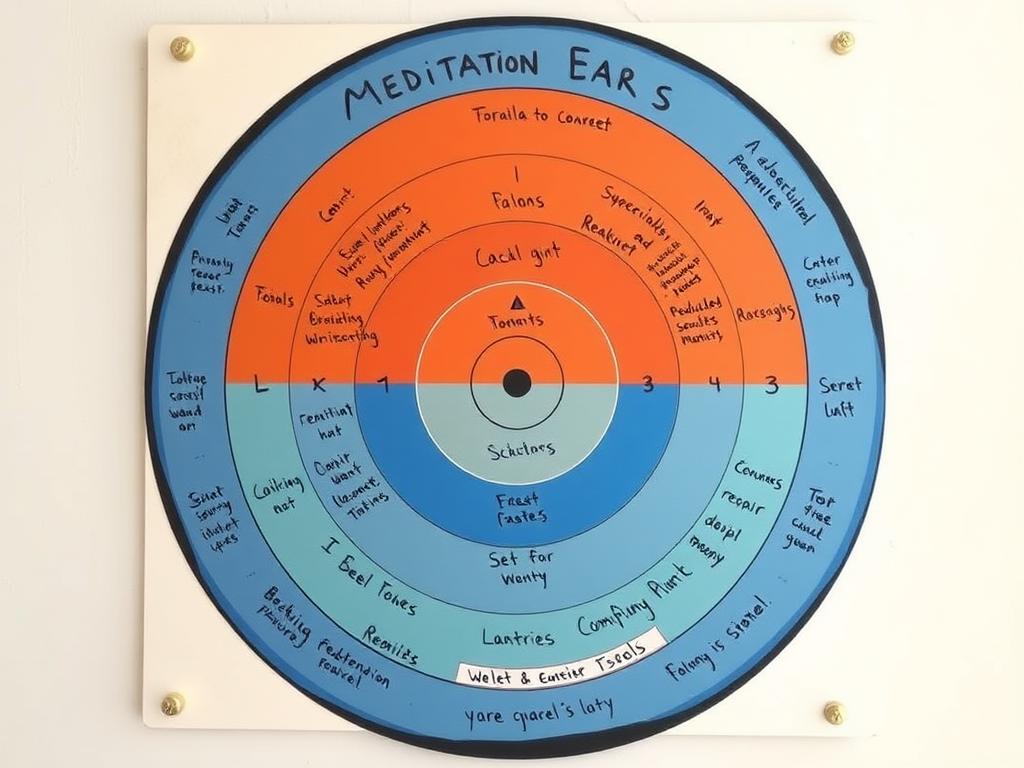Understanding the Purpose Behind Meditation
Meditation is a transformative journey, uncovering layers of inner understanding and cultivating a sense of tranquility. The goal of meditation extends beyond mere practice; it’s a quest for insight, balance, and spiritual awakening. As seekers embark on this path, they find meditation for stress reduction and peace of mind becomes vital. Whether one begins through online meditation courses or joins meditation classes nearby, the purpose remains deeply personal. By embracing techniques in Meditation for beginners and exploring various types of meditation, individuals unlock the benefits of letting go, fostering self-compassion, and nurturing gratitude. Through meditation retreats, the experience deepens, nourishing the spirit and inspiring positive thinking towards oneself and the universe.

What is Meditation
Meditation is the art of attuning one’s mind to a harmonious rhythm, seeking inner clarity and peace. This ancient practice invites individuals to pause, breathe, and uncover a deeper sense of self-awareness. Meditation techniques vary, from mindfulness practices to guided meditation music for relaxation, offering diverse paths that resonate with different people and their unique lifestyles. It serves as both a refuge and a bridge to mindfulness, connecting one’s spiritual essence with the present moment.
At its core, meditation cultivates a profound sense of gratitude, encouraging individuals to shift their focus from external chaos to inner calm. Meditation for beginners often initiates this shift, providing a gentle introduction to mindfulness and compassion. Participants in meditation retreats or those exploring the best meditation apps find this journey transformative, as they tap into a source of positivity, balance, and rejuvenation.
Meditation encompasses a wide range of practices, each aiming to nurture peace of mind and spiritual growth. Practitioners may engage in meditation for stress reduction, self-compassion, or even as a tool for weight loss. The Benefits of meditation are vast and continue to be a beacon for those seeking mental, emotional, and spiritual enlightenment.
To deepen meditation practice, one might explore local meditation classes or online meditation courses. Practical tips such as setting a dedicated meditation space or using calming scents can enhance this transformative experience, making each session a step towards personal growth and spiritual awakening.

The Primary Goals of Meditation
The essence of meditation lies in its ability to cultivate a balanced and harmonious state of mind. Among its primary goals is fostering a deep sense of inner peace and clarity. Meditation techniques, whether practiced independently or through guided sessions, provide individuals with the tools to cope with life’s challenges. Embracing meditation creates a sanctuary within, allowing them to navigate the world with renewed positivity and resilience.
Enhancing one’s emotional well-being is another goal of meditation. By promoting gratitude and self-compassion, meditation nurtures a positive mindset, encouraging individuals to live fully in the present. Many people find their way to this practice through online meditation courses or nearby meditation classes, seeking a life enriched with emotional balance and tranquility. This journey toward emotional harmony is transformative and deeply rewarding.
Spiritual awakening represents one of the most profound aspirations within meditation. This goal involves transcending everyday concerns to connect with a greater sense of purpose and spiritual clarity. Did you know? A study revealed that nearly 40% of meditation practitioners report an enhanced sense of spiritual awareness, demonstrating its powerful impact. Spiritual seekers often find invaluable resources in the diverse types of meditation suited to their spiritual paths.
Reducing stress and improving mental health also stand at the forefront of meditation goals. Meditation for stress reduction has proven beneficial, fostering physical relaxation and mental calm. Practitioners report improvements in overall health and well-being, often complemented by the soothing effects of meditation music or apps. As a holistic practice, meditation opens doors to healing, encouraging individuals to embrace well-being as a continual journey.

Meditation and Self-Awareness
Meditation serves as a mirror reflecting one’s innermost thoughts and emotions, guiding individuals toward enhanced self-awareness. Through this practice, individuals embark on an inward journey, discovering layers of themselves previously unacknowledged. The benefits of meditation extend beyond relaxation; they open avenues for profound introspection and personal growth. For those new to this journey, meditation for beginners offers foundational techniques to cultivate mindfulness and a deeper awareness of the mind’s nuances.
While many believe that meditation solely serves to calm the mind, there’s a strong case for its role in cultivating self-awareness. This heightened awareness empowers individuals to recognize and understand their thoughts, emotions, and behaviors. Meditation classes nearby often emphasize this aspect, providing supportive environments where participants can explore their consciousness with curiosity and compassion. The exploration of self can lead to transformative insights and a better understanding of one’s true essence.
Meditation and self-awareness together help nurture a practice of gratitude and self-compassion. By developing a non-judgmental awareness of themselves, practitioners foster acceptance and empathy, paving the way for personal healing. Meditation techniques, whether practiced at home or during Meditation retreats, encourage individuals to engage with their inner world, embracing both strengths and vulnerabilities. This holistic approach lays a foundation for authentic self-expression and emotional resilience.

The Impact of Meditation on Physical Health
Meditation offers not only mental clarity but also profound physical health benefits. Practices like meditation for stress reduction can positively affect the body’s stress response, leading to lower blood pressure and improved heart rate variability. Meditation techniques contribute to enhanced relaxation, which can reduce the production of stress hormones. These physical benefits amplify the holistic nature of meditation, underscoring its role in promoting overall well-being.
Regular meditation practice can positively influence the immune system, promoting better physical health. In the words of Dr. Jon Kabat-Zinn, “Meditation is about paying attention. That’s what the ancient cultures say, your health improves when you do that.” Engaging in Meditation music for relaxation or local meditation classes helps nurture a connection between mind and body, bolstering immune function through reduced stress and enhanced mental focus.
Additionally, meditation has been associated with helping individuals achieve healthier weight management. Meditation for weight loss is gaining recognition, as mindful eating habits are cultivated through heightened self-awareness. Meditation retreats often emphasize this connection, offering spaces where individuals can explore mindful living. The benefits of meditation demonstrate its ability to influence physical health positively, encouraging a lifestyle of conscious living and radiant health.

Meditation in Modern Life
In the hustle and bustle of modern life, meditation offers an essential refuge—a tool for grounding and rejuvenating amidst daily demands. It has seamlessly integrated into various facets of contemporary society, providing people the opportunity to pause and reflect. The benefits of meditation extend from increasing productivity at work to enhancing peace of mind, making it a valuable practice for achieving balance and fulfillment.
For many, meditation begins as a response to stress, opening doors to improved well-being. Meditation techniques tailored for beginners are accessible through online meditation courses and the best meditation apps, guiding individuals toward a more centered and mindful lifestyle. The emphasis on mindfulness and gratitude in these practices reinforces a positive outlook, transforming routine moments into opportunities for mindfulness and appreciation.
A concrete example of meditation’s impact is evident in corporate wellness programs, where companies are incorporating meditation sessions to boost employee morale and efficiency. By offering meditation classes nearby or providing resources like meditation music for relaxation, businesses promote a healthier work environment. This integration highlights meditation’s adaptability and relevance in enhancing both personal and professional life.
Meditation also empowers individuals to explore diverse spiritual and personal growth paths. The availability of various types of meditation and meditation retreats encourages exploration, allowing individuals to find practices that resonate with their unique needs. Whether it’s meditation for stress reduction or spiritual awakening, individuals are equipped to embark on personal journeys of self-discovery and healing.
As meditation becomes more ingrained in everyday life, its capacity to improve one’s quality of life is undeniable. The cultivation of self-compassion, positive thinking, and spiritual clarity stands as a testament to its transformative power. Embracing meditation in modern life not only enriches individual well-being but also invites a collective shift toward mindfulness and connectedness in the broader society.

Challenges in Meditation Practice
Beginning a meditation practice can present several challenges, often rooted in the difficulty of quieting the mind amidst life’s constant noise. Many newcomers find it hard to maintain focus or sit still, losing patience when results aren’t immediate. Meditation for beginners addresses these hurdles by introducing accessible meditation techniques and routines. These initial struggles are normal, but perseverance can transform occasional frustration into enduring peace and clarity.
Another common challenge is finding consistency, as life’s demands can disrupt a regular practice. Insights from Jon Kabat-Zinn, a pioneer in mindfulness meditation, suggest that embracing meditation as a daily habit—much like brushing one’s teeth—can help integrate it seamlessly into one’s life. He emphasizes the importance of self-compassion in facing these challenges, encouraging practitioners not to strive for perfection, but rather to appreciate progress in their journey toward self-awareness and spiritual awakening. Through commitment, individuals can overcome these barriers, reaping the profound benefits of their practice.

Frequently Asked Questions
What is the primary goal of meditation?
The primary goal of meditation is to achieve a state of deep inner peace and increased self-awareness. By engaging in regular meditation practices, individuals can cultivate mindfulness, spiritual clarity, and emotional well-being. This ancient technique is aimed at balancing both the mind and body to foster a harmonious life experience.
How can beginners start practicing meditation?
Beginners can start practicing meditation by exploring basic meditation techniques and seeking online meditation courses or local classes. It’s important to begin with short, guided sessions using resources like the best meditation apps to build comfort and familiarity. New practitioners are encouraged to be patient and compassionate with themselves as they develop their routines.
What types of meditation are most effective for stress reduction?
Mindfulness and transcendental meditation are among the most effective types of stress reduction. These practices focus on promoting relaxation and shifting attention away from stress-inducing thoughts. By regularly practicing these techniques, individuals can experience reduced stress levels and improved emotional balance.
Are there physical health benefits associated with regular meditation?
Regular meditation offers numerous physical health benefits, including improved immune function and reduced hypertension. Meditation practices help alleviate stress, which in turn can lower the risk of stress-related health issues. Engaging consistently in meditation can have a positive impact on both mental and physical well-being.
Can meditation promote positive thinking and self-compassion?
Meditation is a powerful tool for fostering positive thinking and self-compassion. Individuals learn to approach themselves with kindness and understanding through heightened self-awareness and mindfulness. This shift in perspective encourages a more positive and nurturing relationship with oneself, leading to greater emotional resilience.


